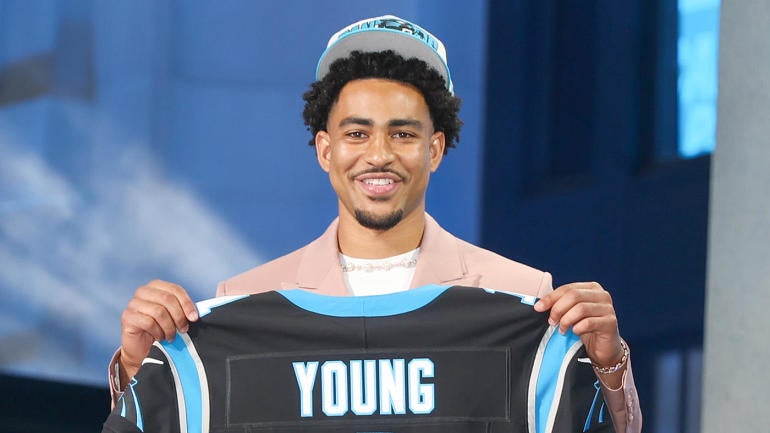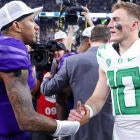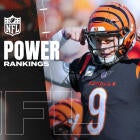
The first five picks in the 2022 NFL Draft signed their rookie contracts within 15 days after being selected. It was the fastest signing of these picks since the 2011 NFL collective bargaining agreement (CBA) implemented the rookie wage scale, which drastically reduced salaries at the top of the draft.
Will Anderson, who was selected third overall by the Texans, is the only 2023 top-five pick who's under contract. The University of Alabama edge rusher signed on June 23.
The pace of signing with this year's first five picks is reminiscent of before the rookie compensation system was overhauled in the 2011 CBA. Most first-round picks, particularly those at the top of the draft, didn't sign contracts until the start of training camp was approaching. The first NFL training camps open for rookies in less than a week on July 18.
The holdup with these draft picks isn't money. Each pick has a salary floor and ceiling based on draft position. All rookie contracts are four years in length, except teams have an option for a fifth year with first-round picks that must be exercised after the third year of the deal.
Three quarterbacks (Bryce Young, C.J. Stroud and Anthony Richardson) were among the first five picks. The contract each player is expected to sign is in the following chart.
| Draft Pick | Player | Team | 2023 Salary Cap Number | Signing Bonus | 4-Year Total |
|---|---|---|---|---|---|
1 | Bryce Young | $6,900,922 | $24,603,688 | $37,955,071 | |
2 | C.J. Stroud | Texans | $6,596,226 | $23,384,904 | $36,279,243 |
4 | Anthony Richardson | $6,180,733 | $21,722,932 | $33,994,032 |
Signing bonus payment
The primary disagreement is over the payment schedule of the signing bonus. Large signing bonuses in NFL contracts aren't customarily paid in one lump sum. They have typically been paid in two to four installments. This is a longstanding practice in the NFL.
Lump sum payments are starting to become more accepted at the top of the first round. Generally, quarterbacks have been more successful in getting signing bonuses paid in its entirety shortly after signing.
The Jaguars made a big departure from their customary signing bonus payment schedule with 2021 first overall pick Trevor Lawrence. His entire $24,118,900 signing bonus was payable within 15 business days of signing. In addition to Lawrence in 2021, quarterbacks Zach Wilson and Trey Lance -- the second and third overall picks -- got their $22,924,132 and $22,163,824 signing bonuses paid in a lump sum, respectively, by the Jets and 49ers. Receipt of the money was in a similar time frame as the first overall pick's signing bonus.
Lawrence established a new precedent for Jacksonville. One year later, 2022 first overall pick Travon Walker, an edge rusher, was able to get the same payment schedule as Lawrence from the Jaguars with his $24,360,088 signing bonus.
The first two picks in 2020 had lump sum signing bonus payments. First overall pick Joe Burrow's $23,880,100 signing bonus was paid within 15 days of signing his contract with the Bengals. Second overall pick Chase Young, who is an edge rusher, got his $22,697,160 signing bonus from the Commanders within 30 days of signing.
Prior to that, 2018 third overall pick Sam Darnold got a lump sum payment from the Jets. The quarterback's entire $20,078,324 signing bonus was payable within 15 days of him inking his deal. Also, 2019 second overall pick Nick Bosa's signing bonus was payable in the same time frame as Darnold's. The edge rusher got $22,421,356 as a signing bonus.
Young is surely trying to extend the lump payment streak with the first overall pick to four years. Kyler Murray in 2019 was the last first overall pick who had his signing bonus paid in installments. Of Murray's $23,589,924 signing bonus, $16.75 million was paid on June 3, which was a little more than three weeks after his contract was executed. The remaining $6,839,924 was deferred until March 1, 2020.
Carolina has had top 10 picks in each of the last three drafts. None of the players has received a signing bonus in a lump sum. For example, 2022 sixth overall pick Ikem Ekwonu received $12,060,644 of his $17,299,492 signing bonus within 30 days of executing his contract. The remaining $5,168,848 wasn't payable until April 1, 2023. The Panthers' rookies report to training camp on July 22. The veteran player reporting date is July 25.
Stroud has more obstacles to overcome than Young to get a lump sum payment. The Texans will likely want to treat Stroud and Anderson the same on signing bonus payment since they were selected consecutively with the second and third overall picks.
Anderson's signing bonus is being paid in two installments. He received $19.218 million (or 85%) of his signing bonus with 15 days of signing. The remainder will be paid to him on Oct. 15. Although Anderson isn't getting his signing bonus in a lump sum, his payout is better than 2022's third overall pick Derek Stingley Jr.'s, who was also drafted by the Texans.
The cornerback got $17,908,372 (or 80%) of his $22,385,464 signing bonus within 15 days of signing. The other $4,477,092 was paid on Dec. 15.
Complicating matters for Stroud is 2022 second overall pick Aiden Hutchinson. Half of the edge rusher's $23,153,372 signing bonus was paid by the Lions within 30 days of signing. The other half was received in the middle of September. Hutchinson's payment schedule was essentially the same as 2021 seventh overall pick Penei Sewell had with the Lions. Stroud might contend that Hutchinson is a second pick anomaly because the last three players selected second overall before him (Wilson, Young and Bosa) got lump sum signing bonus payments.
It wouldn't be surprising for Stroud to wait to see what happens with Young before signing. The Texans open training camp for both rookies and veterans on July 25, which is three days after the Panthers' rookie reporting date.
As long as Young's deal gets done so he can report to training camp on time, Stroud might be able to use it to help his cause. Obviously, Young being unsuccessful in establishing a new Panthers precedent would effectively end any chance of Stroud getting his signing bonus paid in a lump sum.
Richardson is at a bigger disadvantage than Stroud with a lump sum payment. The fourth overall pick's signing bonus has been paid in installments. For example, 2022 fourth overall pick Ahmad "Sauce" Gardner got $16,130,889 of his $21,507,852 signing bonus on May 31, which was slightly more than three weeks after he signed. The rest was paid this past March 1. Colts rookies and veterans report to training camp on July 25.
Offsets
The other sticking point, particularly with Young, could be offsets. An offset clause allows a team to reduce the guaranteed money owed to a player when he is released by the amount of his new deal with another team. The player receives his salary from the team that released him in addition to the full salary from his new contract with another club when there isn't an offset (also known as "double dipping").
Agents have essentially lost the battle on offsets. Teams with early first-round picks in 2013 were adamant that contracts contain offsets after largely conceding the issue the previous year. As a compromise for top 10 picks, teams structured deals with minimum-base salaries in the final three years where the remainder of a player's salary is in annual fully guaranteed third or fifth day of training camp roster bonuses. Training camp roster bonuses are now starting to extend to the latter part of the first round.
Nearly every team besides the Jaguars and the Rams, who didn't have a first-round pick this year, requires offsets with salary guarantees for draft picks, including those selected in the top 10. Anton Harrison is the only 2023 first-round pick whose contract doesn't contain offsets because he was selected by the Jaguars. He was the 28th overall pick.
The previous two first overall picks -- Lawrence and Walker -- don't have offsets since they were drafted by Jacksonville. Additionally, the Jaguars didn't necessitate offsets with Devin Lloyd and Travis Etienne's guarantees, who respectively were 2022's 27th and 2021's 25th overall picks.
A quarterback has the best chance of extracting a concession on offsets than players at other positions. Mitchell Trubisky, the second overall pick in 2017, signed a deal with the Bears where his $465,000 base salary in 2017 and training camp roster bonuses in 2018 through 2020, which contained most of the money in the last three years of his contract, didn't have offsets. His league minimum base salaries in the last three years of his contract had offsets.
The only other Bears' first-round pick under the rookie wage scale to get a concession like Trubisky was another quarterback, Justin Fields. As 2021's 11th overall pick, Fields got the same treatment as his 2017 predecessor. His $660,000 2021 base salary and 2022 through 2024 training camp roster bonuses don't have offsets.
Young is probably insisting that the Jaguars have established a first overall pick precedent of no offsets that should also apply to him. It should be noted that Burrow as 2020's first overall pick signed a rookie deal where his guarantees have offsets.
Final thoughts
Young has the most leverage to get a lump sum signing bonus payment and some, if not all, of his guarantees with no offset. His situation is somewhat analogous to 2015 second overall pick Marcus Mariota's with the Titans. Mariota was the last first-round pick to sign in 2015. The delay was because of a disagreement over offset language.
The Titans compromised where Mariota obtained a concession that the team's other recent first-round picks couldn't get. That's because the Titans didn't want Mariota missing the start of training camp in a contract dispute since he was going to be the opening day starting quarterback. His training camp roster bonuses in 2016 through 2018 where most of the money was in the last three years of his rookie contract didn't have offsets.
The Panthers have already named Young as their starting quarterback. Making sure Young doesn't miss any of training camp, especially once the veterans report on July 25, could lead to the Panthers making contractual exceptions for him. The lump sum payment is the more likely contract exception because it will be easier for the Panthers to justify given the more extensive recent history of a signing bonus being paid in its entirety shortly after signing.
Stroud isn't quite in the position as Young to potentially play hardball over these items. He still has to earn Houston's starting quarterback job in training camp and the preseason. His best bet for getting any concession, particularly with his signing bonus payment, is to let Young sign first.
Stroud could make Young's negotiation more difficult by agreeing to a payment schedule like Anderson's before Young reaches an agreement. The Panthers might be more inclined to preserve contractual precedents if Stroud already has a deal where his signing bonus is paid in two installments.





















